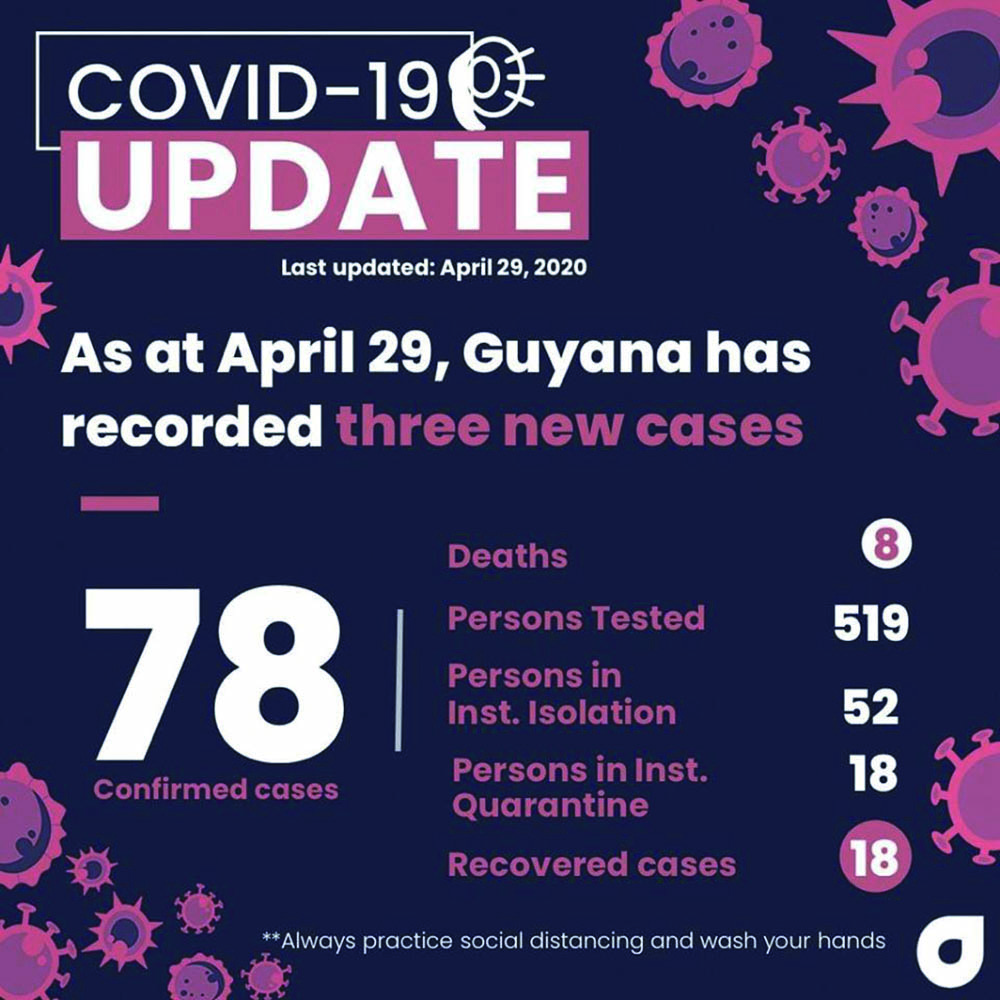Guyana has recorded three more coronavirus disease (COVID-19) cases, bringing the country’s total to 78 cases – a majority of which are from Georgetown communities.
 This was revealed by caretaker Public Health Minister Volda Lawrence during her daily update on Wednesday.
This was revealed by caretaker Public Health Minister Volda Lawrence during her daily update on Wednesday.
She noted that while the number of COVID-19-related deaths remained at eight, the number of persons considered recovered from the life-threatening disease thus far has increased to 18. Currently, there are three persons in the COVID-19 Intensive Care Unit (ICU) at the Georgetown Public Hospital.
Additionally, the number of persons tested to date has also climbed to 519, of which 441 were negative.
As of Wednesday, 18 persons were in institutional quarantine while there were 52 persons in isolation.
Hotspots
Meanwhile, Lawrence went on to note that Georgetown continues to be the epicentre of the novel coronavirus outbreak here in Guyana.
Positive cases have been identified in Kitty, Sophia, Turkeyen, Liliendaal, Cummings Lodge, Alberttown and Cummingsburg. Cases were also located in Bourda, Lamaha Park, South Ruimveldt, and Thirst Park.
“…you would note from the areas listed that the coronavirus disease is in several of the densely populated areas in our city. We need to stop and take stock of this situation; you must adhere to the guidelines provided or we will be in a situation that we cannot control,” the caretaker Public Health Minister stated.
Lawrence further reminded of how Guyana suffered during the Spanish flu period, noting that no one wanted a repeat of this.
The Public Health Ministry continued to highlight the impact of the coronavirus on the most vulnerable populations. It recognises that mental health and wellness are important for persons to survive this crisis.
Mental health
During Wednesday’s update, Director of the Mental Health Unit at the Ministry, Dr Util Thomas noted that everyone was affected in some way or the other by COVID-19.
“We have been forced to adapt to a new lifestyle to protect ourselves and our loved ones. Staying at home with our families, wearing a mask, washing our hands regularly, and finding new hobbies and routines have become the new norm. Many of us are finding it hard to adjust. The stress associated with this period is manifesting in different ways for some of us; lack of sleep, constant fear, anger, confusion, frustration, anxiety, and depression are what we face daily,” she stated.
According to Dr Thomas, in order to cope with all these different challenges, persons should ensure that they are talking to someone they trust about their problems, thoughts, and feelings.
“Even if that person cannot solve the problem, just talking sometimes is enough. A problem shared is a problem halved. When we talk about a problem, our brain releases chemicals which ease the symptoms of stress. Vice versa, we must be ready to listen to others so that they too can have the same benefits. Listen without being judgmental or forcing persons to talk,” she stressed.
The Mental Health Director further explained that persons should know about the help available to them especially in their communities. These include: the religious groups, non-governmental organisations, the health-care facilities where health-care workers are found, Ministries and other Government departments, clubs, etc.
Dr Thomas went on to note that persons should set aside unrealistic tasks that they may not be able to complete and instead, prioritise focus on those that can be done with ease. This, she explained, will reduce stress and increase their sense of achievement, which will then give them the opportunity and drive to focus on the larger tasks.
She added too that persons should set aside time for themselves every day.
“…when you neglect your personal time, everything else suffers. So, find the time to look after you. Include restarting old hobbies such as reading, cooking, sewing, playing a musical instrument, knitting, board games, art, decorating, gardening, keeping pets, listening to music among other things,” she suggested.
The Mental Health Director also recommended that persons stay connected with family, friends, workmates and whatever clubs, organisations or social groups they may belong to. She explained that fulfilment of basic social needs such as love, belonging and connectedness brings a feeling of security and contentment which is very important in preventing depression.
Exercise, sleep, and eat healthily every day, Dr Thomas added, as these were powerful stress busters and natural anti-depressants.
She also suggested persons journaling twice per week about things they were grateful for, as this practice has been shown to have powerful positive effects on emotional well-being.
Moreover, it was noted that help can be sought from the Mental Health Unit or any other health-care worker to relieve persons of their anxiety and help them to cope.
Meanwhile, Lawrence added that the Public Health Ministry stood ready to provide psychosocial support for persons who are desirous of this service.
 This was revealed by caretaker Public Health Minister Volda Lawrence during her daily update on Wednesday.
This was revealed by caretaker Public Health Minister Volda Lawrence during her daily update on Wednesday.